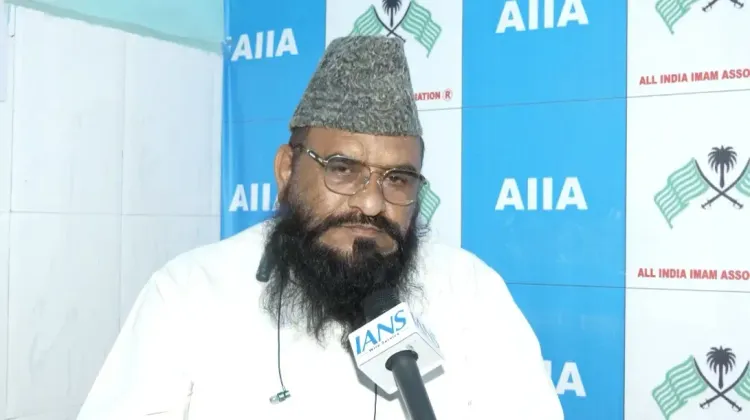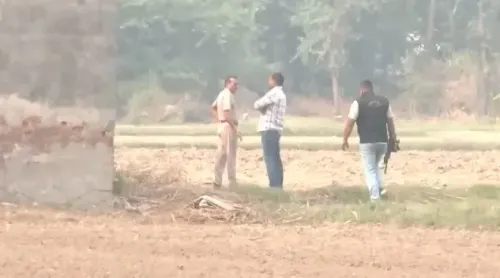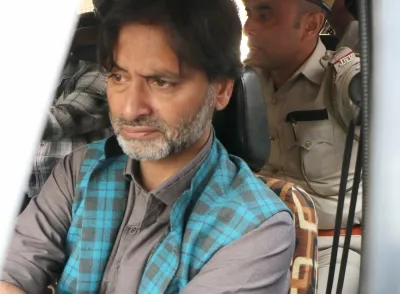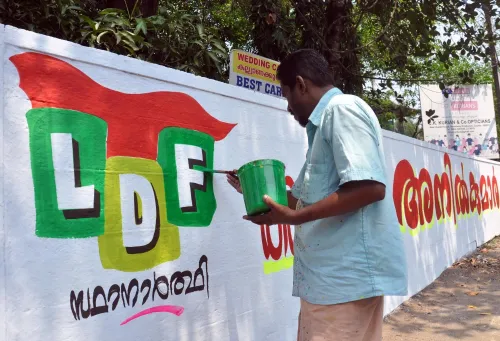Maulana Sajid Rashidi Urges Muslims to Remain Calm on Waqf Act

Synopsis
Key Takeaways
- Maulana Sajid Rashidi urges peace over protests.
- Criticism of leaders inciting unrest for political gain.
- Concerns over violence in Murshidabad, West Bengal.
- Support for the Waqf (Amendment) Act.
- Encouragement for Muslims to focus on education and progress.
New Delhi, April 12 (NationPress) Maulana Sajid Rashidi, the President of the All India Imam Association (AIIA), made a call to Muslims nationwide on Saturday, urging them to refrain from protesting against the newly enacted Waqf (Amendment) Act. He highlighted the significance of peace and education rather than unrest.
In a conversation with IANS, Maulana Sajid Rashidi remarked that the Waqf Bill has officially become law. “There is nothing in it that justifies street protests. Some individuals appear to incite riots, like Asaduddin Owaisi, whose remarks encourage Muslims to protest and warn of conspiracies to seize mosques. Such rhetoric seems aimed at stirring up communal disorder,” he stated.
He accused Owaisi of harboring intentions for unrest to position himself as a ‘Jinnah’ and establish a separate nation.
Furthermore, he criticized certain leaders and groups that he believes are inciting unrest for personal or political motivations.
“Many of the protesters possess significant assets, whether it is Owaisi in Hyderabad or members of the All India Muslim Personal Law Board who have land in Rajasthan and Delhi—they do not represent the average Muslim. They exploit the situation for their own advantage,” he added.
Maulana Rashidi voiced his worries about the recent violence in Murshidabad, West Bengal, where protests escalated into violence, resulting in arson and damage to public property.
“Once crowds are on the streets, controlling them becomes challenging. We have witnessed the consequences - vehicles are set ablaze, individuals are harmed, and chaos ensues. While protesting is a constitutional right, it must be executed peacefully. Taking to the streets risks portraying Muslims as instigators once more,” he emphasized.
He further urged Muslims to redirect their focus towards advancement and education.
“This is not the moment to be arrested or invite trouble. Instead, we should prioritize education, business, and national progress. Other communities do not protest every time they disagree with a government decision. Why should only Muslims be pressured to do so?” he questioned.
Reaffirming his support for the Waqf (Amendment) Act, Maulana Rashidi stated: “I backed the Act then, and I stand by it now. Why should Muslims oppose it just because someone suggests we do? We are citizens of this nation and have significantly contributed to its freedom. More than 37,000 Muslims are recorded as revolutionaries in the National Museum. Why should we be labeled as troublemakers or terrorists?”
He also commented on West Bengal Chief Minister Mamata Banerjee’s recent declaration that the Waqf Act will not be enforced in the state.
“No Chief Minister or individual has the right to defy a law passed by Parliament and endorsed by the President. Such opposition is unconstitutional and amounts to treason. This is merely vote-bank politics aimed at inciting Muslims. The Opposition is engaging in a perilous game by attempting to mobilize Muslims onto the streets.”
Maulana Rashidi concluded with a call for reflection within the community.
“Why is the Opposition urging Muslims to protest? Have you observed any party advocating, ‘Let Hindus join us on the streets too’? No. They merely want Muslims to protest, and we ultimately bear the consequences. The Constitution does not permit selective law enforcement. Muslims must think wisely, remain calm, and consider the larger perspective,” he stated.
He also advised the community to reevaluate its political affiliations.
“For 60 years, Muslims have supported Congress and other parties, yet we still feel marginalized. Why not allow BJP a chance for five years? If it does not work, we can make a different choice,” he concluded.









